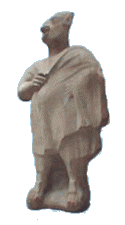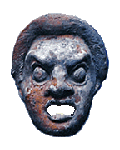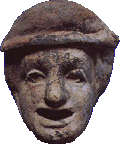To give an accurate description of what has never occurred is not merely the proper occupation of the historian, but the inalienable privilege of any man of parts and culture.
Oscar Wilde, 1854-1900
The Art of Parasitic
Table of contents:
As guidance: Although I was trained as a scientist, I try to contribute with this essay to the connection between the empirical-analytical and the historical-hermeneutical sciences. I believe that a parasitologist should be informed of the origin of the term, which represents the name of the science he is practicing. For, as Jürgen Habermas writes, the historico-hermeneutical sciences help us to interpret folkways that make a better accessibility for us to our self-understanding.
W2.1 The Parasitus of the Antiquity
A παρασιτος, in Latin a parasitus, of the Greek antiquity was a co-eater, as a historically used term: a comedo, tolerated at a symposium, but not invited and not endowed with the rights of a guest. Etymologically the word derives from "para" = in, near, next to, beside and "sitos" = wheat, any grain, grain in the natural state; prepared then flour, bread; therefore also in general for food, diet and dish. As usual in antiquity, communal authorities and a professional practice with a public appearance were almost exclusively open to adult men only. Therefore, only the male form of the phenomenon is mentioned in this essay, a reference of a woman as a parasitus is not known to me.
But, a millennia long development preceded the little respected (professional) status of a parasitus in the classic ancient society; it reflects an unprecedented devaluation of this socially enforced activity: at the beginning there is the archaic young Stone Age society in Greece. At that time, the service to the community was identic with the service to the Gods. The servant of a deity was usually not the priest. To be specific, the priest was the interpreter of the will of the deity; in modern terminology, he was the interpreter of generally accepted customary law and the soothsayer. The original servant of a deity, however, was the administrator who had to coordinate the offering services. Usually his tasks were not only the timely deployment of the offering things, but also the construction and maintenance of facilities appropriate to the Gods such as temples, sacrificial sites and city walls. He was the chosen one who presented the offerings of the community, an early form of a Council tax, to the Gods for their alimentation and in doing so he was allowed to use a third of the offerings for his own nourishment. As a valued member of the God´s staff he took the meal together with his host, the deity, as well as any other free employee in a civil mansion. In this way he was "para" = near and "sitos" = the Holy grain, the food of the deity, the sacrificial offering, he was the παρασιτος. He dined with the deity, he was agent of the landlord, his entertainer, the subsequent Major Domo, and arguably claque, for which he was compensated with food from the table of the deity. Considered profane, he received a salary from the taxes offered to the deity. The parasitus was one, sometimes even the sole administration official of a municipality, he initiated and coordinated most community projects, which had almost always sacred character. The social peace depended on his skills and partially even the municipal welfare of a community (of faith). Due to this high level of accountability in most archaic communities the parasitus was selected from the group of meritorious citizens on time in most archaic communities - ideally he should be the designated friend of the deity. From the comedy The heiress from Diodorus of Sinope (3rd century BC) comes the view that the parasitic was an art, and the only art that has been created by the gods, by Zeus Philos (Friend Zeus, confidential title), the God of friendship and an unrestrained selfish glutton and huge drunkard even.
W2.2 Permutations
This ideal picture of a parasitus has undergone numerous changes over the course of a social development lasting more than a Millennium. These changes are mainly influenced by local special developments, for example in the ancient oriental-hellenistic antiquity. A continuous line of development can be observed however:
Everywhere in the ancient Western world it came to the privatisation of the offerings to the gods and as a result to a separation of the - now private - God´s service from the public administration and justice. As a consequence the forming of central power brokers happened, a public administration and law jurisdiction point equipped with Empire, a tyrant, King, Consul etc. The parasitus, however, inherently conservative, remained at the full fleshpots as a companion of the traditional deities with diminished responsibility. Step by step he was privatised also and thus stripped of all of his administrative powers. Ultimately he served a (Roman) Goddess of the House only in appearance, he was the more or less welcomed cult servant, who himself had to pander to the man of the house for eating. He was completely and utterly at the Landlord´s mercy, because of this he also lost his social acceptance and thus the communities' economic hedging. The extensive loss of traditional religious values in the late Antiquity withdrew the parasitus any spiritual basis, he degenerated to a Jester, a buffoon and a blandisher of the Landlord. The following aspersion about the parasitus comes along from the Sicilian playwrighter Epicharmos († 460 BC): "He likes to be a guest of anyone who wish to have him, you just need to call him, but he is there also when you don´t want him, and you also don´t need to call him; because he is amiable and makes a lot of jokes and praises the host, and if anybody disagrees with the hosts talk, he scolds him and he is his enemy, when he has eaten his fill and has drunk, he goes home, no slave lights him the way, alone he sneaks into the dark."
Two types of an anomalous development should be mentioned:
First, the Oriental part of the ancient world had and has a still noticeable tendency to a deification of the respective sovereign. This tendency led to a legal claim of the godlike ruler for parasiti of his own and thus, in the consequence, to a right of the ruler on an offering, ie on a tax amount of his subjects to his private jewel case. So, the parasitus of the East became an unloved tax collector.
Secondly, in the largely secular City-States of classical ancient Greek antiquity a conversion of parasitus occurred from the sacred servant of a deity to a meritorious honoured, secular guest of the community, dining every day at public expenses in the town hall (Prytaneion). So, the dignified society with the deity changed to a kind of pension for respectable disused.
W2.3 Manifestations
Fig. 1: A parasitus. Greek, 2nd century. The British Museum, London. © A. Hassl.
To live his life as a classical parasitus, the buffoon of the house, not every citizen was a priori equally well qualified: mostly he was an illegitimate free young man who, due to his lack of birth, was usually not authorized to inherit and was thus impoverished after the termination of the father´s duty of care, or he squanders the assets of his father as heir. As a member of the ancient family, he enjoyed a good education while he grew up in the circle of his socially higher levelled half brothers, but he had no assets and hardly any views of an honourable acquisition of an estate. He could earn some income just by some "heroic deeds" during a campaign, calling them robbery and plunder, later also by a salary in the military and the civil service. But, if the war found its end too early, or the war was directed against poor enemies, or the young man was disabled as a war hero, he was without an income. Physical work was then reserved for the slaves, servants and freed slaves; anybody who had to labour slipped automatically to their social level. Brain work was a fee-free service, and rental, lease and interest income required assets. Being jammed into this social predicament and corresponding to the then applicable law for such a young man only one activity was possible: the Parasitic. The permission to eat at the table in his father´s house or in a house of a friend of the father had to be bought bitterly quite often. It was expected in return that the parasite made a contribution for the amusement of the guests by flattery, feats, bearing of humiliation and some poetic tales of - if possible own - legendary heroic deeds, sometimes even prostitution was claimed, especially the shameful reputed one with old women. At the right side there is shown a terracotta figure of a parasitus from the Roman period. At that time the parasite was demanded to provide humiliating services to his bread-earner in the bath. In the figure the strigilis (the shave hook) exposed was coloured in yellow for a better identification.
Traditionally two types are distinguished, the (barely) respectable entertainer, a kind of secondarily friend of the family, who had also to endure beatings and humiliations of the (drunken) Landlord and guests (most prominent example: the fist fight serving the amusement of the suitors of the Landlord Odysseus masqueraded as a parasitus with the "beggar" Iro at his homecoming; 18th verse of the Odyssey); and the
Fig. 2: stage mask of a kolax. Archaeological Museum, Lipari. © A. Hassl.
sycophant, the κολαξ = kolax, who presented a rather bad character as a character on the stage of the old attic comedy and was regarded as dishonourable in life, because he - as a bribable brown-noser - was frequently kept like livestock by regents. Klisophos of Athens, the kolax of the Macedonian King Philipp II. (∗ around 382, † 336 BC), is reported that he hid one of his healthy eyes under a bandage for life after Philipp lost his right eye at the siege of Methone. According to U. Enzensberger [2001] this type has strictly to be differentiated from the parasitus.
In plays, some playwrighters make the observation that there are two genera of parasites: the one that is the ordinary and the lampooned in comedies, the so called Black-dressed, which means actors in stage dresses. And then there would be another genus which consists of flattering and parasitic Satraps and generals. Aristophanes (∗ between 450 and 444, † around 380 BC) opus is said that within it there is an equalization - that certainly endangers the author personally - of demagogic acting politicians (Cleon) with a kolax of the Demos (= people of Athens); so to the naming of a ruler as a flatterer and seducer of his host, the people.
Fig. 3: stage mask of a parasitus. Archaeological Museum, Lipari. © A. Hassl.
As an archetype the parasitus is immortalized as an intriguer and schemer in the plays of the classical and late classical authors, mostly in comedies, which are the biographies of the pauperised. From the 4th century onwards the character of the parasitus is the typical trouble maker in the classical Greek comedy. The parasiti Apollinis, the parasites of Apollo, were a Roman table cooperative of freed slaves with the professions tragedy and comedy actors, actor of minor roles, pantomime and mime, founded around 200 BC. It was established for the purpose of improving the living conditions of the actors. So, this is the worldwide first known actors collective with a collaborative intention for protection and thus a stage artists Union.
Famous parasiti in the mythology
- The most successful one, because the immortalised in tradition: Herakles. He, as an illegitimate son of Zeus, became the timeless epitome of an ancient parasitus. Grown up in simple, unsuitable conditions - his stepfather was the expelled, unsuccessful King of Tiryns, he distinguished himself by particular cruelty, abandon, and the ability to mass rape (defloration of 50 forcibly married young women in seven nights) in his early years. After his violent disembodiment he was appointed to the table of the Gods as a perpetual parasite because of his talent, to cheer the clique of the Gods with extensive descriptions of his actions. Thus, he as the ancestor of all Dorians as well as the mission to be a parasite became immortal - later on he even entered the world of the half-gods.
- The most unsuccessful one, because expelled from the table of the Gods and for ever damned: Tantalos. He is presumed to be the ancestor of all ancient parasiti. As an illegitimate, however honourable son of Zeus, he dined as a parasite on the table of the Olympian Gods, he and his descendants were however no members of the House of the immortals. Courting them and to put himself on an equal footing with the Gods, he gave himself a symposium for the gods. For this he sacrificed the highest good, over which he had control, he refined his biological son Pelops. This archaic human sacrifice no longer tasted the Olympian Gods, with the exception of the primeval hunting goddess Demeter. In a transformed way that means, that the hierarchically organized social order as intended by the Gods could no longer be broken, not even by devotement of the most valuable goods. Tantalus was severely beaten by the irascible Zeus, expelled from the olympic table and thrown into the hades, where he must suffer infinitely tantalic torment because of his insolence. His entertainment and his culinary skills were obviously no longer according to the tastes of the time. As a humble-minded parasite on the Table of the Gods Tantalus seems to have been unacceptable, his arrogance was seen as a crime against the Holy Order.
- The cryptic one: Odysseus at the farmyard of the swineherd Eumaios (14th song of the Odyssey). The old but free pig-shepherd Eumaios did not recognize his patron, Odysseus, as he returned home after 20 years absence. Yet he friendly accepted him into his home and hosted him to learn more details of the fate of his Landlord. Because Odysseus masqueraded as the needy son of a rich Cretan, told him of his experience as a soldier during the Trojan war, and of the fact that he was informed about the fate of Odysseus and that this freeman will soon return home, what the pig herder did not want to believe.
- The most bizarre one because significant only as a person having been killed in action and having an immense impact on the literature of Europe as a cadaver: Patroclus at Achill (16th book of the Iliad).
- The most unvalued one: Ion, the illegitimate son of Apollon Phöbos and Creusa, exposed by his mother in a box and brought to Delphi by Hermes, where he ekes out his life as an acolyte in the temple of his father. He is the ancestor of all Ionians.
W2.4 The reception of the term
The transformation of the ancient parasitus in a scientific term was originally in the course of a mistaken reception of the 17th century. The first mention of the quality "parasitic" in the modern sense is found - what irony - in the book written by Sir Thomas Browne in 1646 about popular misconceptions (hoaxes) entitled Pseudodoxia Epidemica: or enquiries into very many received Tenet, and commonly presumed truths. To emphasize his education in litterae humaniores he named mosses, maidenhair ferns and members of the polypody family parasitic plants because from his ultimately botanically wrong point of view they live at the expense of other plants - (. . . and such as living upon the stock of others, are termed parasitical plants, as Polypody, Moss, the smaller capillaries, and many more: . . ) II.vi 101-109). The parasitology as the teachings from the parasitic lifeforms is however mentioned for the first time in 1893 in the London Times.
One of the most important poets of German language, Friedrich Schiller, characterised the character of one of his contemporaries, Georg Forster, in the following Xenion: "Erst habt ihr die Großen beschmaust, nun wollt ihr sie stürzen; hat man Schmarotzer noch nie dankbar dem Wirte gesehen."
An interesting approach is the one of Gottfried Eisenmann [1835], who defined disease as life on living and at the expense of living.
Richard Dawkins refers to religious belief as a "parasitic brain code" and as a "thought virus from the Bronze Age".
W2.5 My adequate publications
- wik117 Hassl A [2005]: Der klassische Parasit: Vom würdigen Gesellschafter der Götter zum servilen Hofnarren. Wiener Klinische Wochenschrift 117 (Suppl 4): 2-5.
W2.6 External adequate publications
- Browne T [1646]: Pseudodoxia Epidemica: or Enquiries into Very Many Received Tenets, and Commonly Presumed Truths. Edward Dod; London. 468 pp.
- Dawkins R [2008]: Vom Virus des Glaubens. Band 2 der giordano bruno stiftung. Alibri Verlag; Aschaffenburg. 42 pp.
- Eisenmann G [1835]: Die vegetativen Krankheiten und die entgiftende Heilmethode. J.J. Palm und E. Enke; Erlangen. 698 pp.
- Enzensberger U [2001]: Parasiten: ein Sachbuch. Eichborn Verl., Frankfurt/Main: 299 pp.
- Homer [ca 850 vChr]: Illias. 24 Gesänge.
- Homer [ca 850 vChr]: Odyssee. 24 Gesänge.
 Andreas R. Hassl
Andreas R. Hassl


